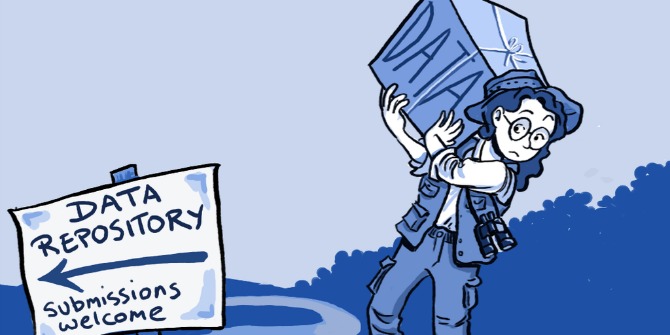 Benedikt Fecher and Gert G. Wagner look at a recent editorial which faced considerable criticism for typecasting researchers who use or build on previous datasets as “research parasites”. They argue that the authors appear to miss the point, not only of data sharing, but of scientific research more broadly. But as problematic as the editorial may be, it points to a wider issue for the scientific community, which is adequate mechanisms for credit and contribution. We could be doing more to provide proper recognition for researchers’ data sharing, data production and data curation efforts.
Benedikt Fecher and Gert G. Wagner look at a recent editorial which faced considerable criticism for typecasting researchers who use or build on previous datasets as “research parasites”. They argue that the authors appear to miss the point, not only of data sharing, but of scientific research more broadly. But as problematic as the editorial may be, it points to a wider issue for the scientific community, which is adequate mechanisms for credit and contribution. We could be doing more to provide proper recognition for researchers’ data sharing, data production and data curation efforts.
In a recent editorial in the New England Journal of Medicine, the authors Longo and Drazen critically assessed the concept of data sharing in medicine. Their main concern is that a “new class of research person will emerge” that uses data for their own original research questions. The authors, although indirectly, later refer to this class of researcher as “research parasites”. The label “research parasites” certainly does not reflect the zeitgeist of an increasingly collaborative research and initiatives towards openness and transparency. However, it does reflect many common misconceptions about academic data sharing.
Longo and Drazen make the (valid) point that data might be misinterpreted. On the other hand, misinterpretation might be a matter of insufficient data documentation by primary researchers. Moreover, potential misinterpretation cannot be an argument for not sharing research data.
 Image credit: Parasite growth (Public Domain)
Image credit: Parasite growth (Public Domain)
But Longo and Drazen miss the very point of scientific research when they write that the researchers may “even use the data to try to disprove what the original investigators had posited”. It is at the core of the scientific paradigm that researchers take nothing as final truth. This is what Popper proposed in his critical rationalism and Merton in his conceptualization of skepticism. Longo’s and Drazan’s requirement to “start with a novel idea, one that is not an obvious extension of the reported work” is simply misleading. Especially medical research (which is the subject of Longo’s and Drazan’s) which has been shown to immensely profit from old ideas through meta-analyses and replication studies that use original datasets.
However the authors touch upon a valid point: the issue of adequate credit for scientific data sharing. They indicate that the adequate form of recognition for data sharing is co-authorship. They suggest to work “symbiotically, rather than parasitically, with the investigators holding the data, moving the field forward in a way that neither group could have done on its own.” While that is certainly true in particular cases, we argue that co-authorship as the sole instrument for giving credit will unnecessarily restrict the potential of data sharing and can even be to the detriment of the original researcher, for instance if the resulting publications lack quality. And in the case of replication studies, co-authorship makes no scientific sense.
The best instrument for giving “credit where credit is due” would be a much higher appraisal of data sharing by research communities via citations of data sets and the consideration of data “production” in career prospects, funding application and evaluations. With this end in mind, this “new class of research person” is exactly the opposite of a research parasite. This person would be someone who is essential to the scientific enterprise in an increasingly data-intensive and collaborative environment. Longo and Drazen’s editorial however shows that there is still a long way to go before we reach Open Science.
Note: This article gives the views of the author, and not the position of the LSE Impact blog, nor of the London School of Economics. Please review our Comments Policy if you have any concerns on posting a comment below.
About the Authors
Benedikt Fecher of the German Institute for Economic Research (DIW Berlin), is a doctoral researcher at the Humboldt Institute for Internet and Society. The focus of his dissertation is the participation in Open Science Projects.
Gert Wagner is Executive Board Member of the German Institute for Economic Research (DIW Berlin) is Professor of Economics at the Berlin University of Technology (TUB), member of the Executive Board of DIW Berlin, Max Planck Fellow at the MPI for Human Development (Berlin) and member of the “National Academy of Science and Engineering (acatech)”.








Until people pay for data from their own purses it belongs to the public. Or to charitable benefactors. It is in the interests of all these people, and of those who give time, blood, etc in many cases, to ensure the maximum use of the data for the general good, and the good of patients where this is relevant.